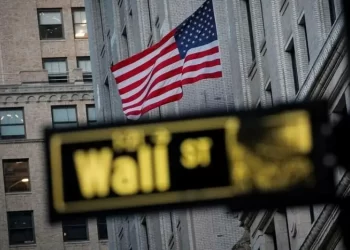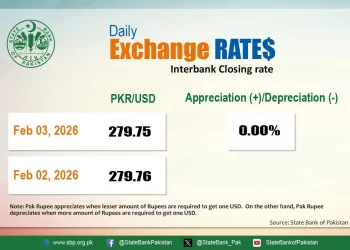Bearish sentiment was witnessed at the Pakistan Stock Exchange (PSX) as investors resorted to trimming their positions over fear of a wider conflict in the Middle East with the benchmark KSE-100 Index losing nearly 800 points during intra-day trading on Monday.
At 2:15pm, the index was hovering around 80,847.42, a decrease of 444.71 points or 0.55%.
Selling was witnessed in key sectors including automobile assemblers, cement, chemical, commercial banks, oil and gas exploration companies and OMCs.
Index-heavy stocks MARI, OGDC, PPL, HBL, MCB and MEBL traded in the red.
Experts said rising geopolitical tensions are playing on investors’ minds, and being reflected on the local front.
During the previous week, PSX remained under pressure and closed in the red zone as the investors opted to offload their holdings on available margins.
The benchmark KSE-100 index plunged by 782.32 points on a week-on-week basis and closed at 81,292.13 points. Foreign investors remained on the selling side and withdrew $12.443 million from the local equity market during the week.
During the previous week, Pakistan received the first tranche of Special Drawing Rights (SDR) 760 million, equivalent to $1.03 billion, from the International Monetary Fund (IMF).
In a key development, Finance Minister Muhammad Aurangzeb stated Sunday that Pakistan’s economy’s “DNA needed to be fundamentally changed” to ensure that the latest IMF agreement is the country’s final one. The minister also stated that Pakistan must declare a “nuclear war” against the cash-based economy as part of the reforms.
Globally, Asia share markets turned hesitant on Monday as strife in the Middle East offset more stimulus measures in China, while the Nikkei dived on concerns Japan’s new prime minister favoured normalising interest rates.
The rush of stimulus helped outweigh a poor manufacturing survey and lift the blue-chip CSI300 another 3.0%, having already jumped 16% last week.
The Shanghai Composite climbed 4.4%, on top of last week’s 13% rally.
Continued Israeli strikes across Lebanon added geopolitical uncertainty to the mix, though the risk of increased supply still restrained oil prices. The week is packed with major US economic data including a payrolls report that could decide whether the Federal Reserve delivers another outsized rate cut in November.
This is an intra-day update








